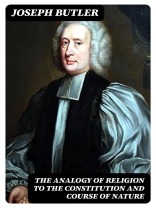Joseph Butler’s ’The Analogy of Religion to the Constitution and Course of Nature’ is a thought-provoking treatise that presents a philosophical argument for the existence of God based on the natural world. Written in a concise and logical manner, Butler’s work showcases his keen insight into the moral and ethical implications of religious belief. The book provides a detailed analysis of the similarities between the natural order and religious principles, drawing parallels between the two to support his argument. Influenced by the Enlightenment period, Butler’s literary style is characterized by its clarity and rationality, making it accessible to a wide audience. The book’s exploration of the relationship between religion and nature is a significant contribution to the theological discourse of the time, challenging readers to consider the implications of divine providence in the world. Joseph Butler, a prominent Anglican bishop and philosopher, wrote ’The Analogy of Religion to the Constitution and Course of Nature’ as a response to the skepticism and rationalism of his era. Drawing on his background in theology and ethics, Butler presents a compelling argument for the existence of God based on the observation of the natural world. His nuanced understanding of moral philosophy and religious doctrine informs the foundational principles of the book, offering readers a fresh perspective on the intersection of faith and reason. I highly recommend ’The Analogy of Religion to the Constitution and Course of Nature’ to readers interested in exploring the rational basis for religious belief and its implications for understanding the natural order.
Om författaren
Joseph Butler (1692-1752) stands as an eminent English philosopher, theologian, and bishop whose contributions have exerted lasting influence on religious thought and ethics. Most notably recognized for his work ’The Analogy of Religion to the Constitution and Course of Nature’ (1736), Butler sought to reconcile Christianity with the scientific and philosophical advancements of the Enlightenment era. Within this seminal text, he presents a rational approach to religious belief, emphasizing that the natural world and human experience reflect a divine order, analogous to the truths of revealed religion. Butler’s careful reasoning provided a robust counterargument to contemporary skeptics and deists, asserting the probability of divine governance in a manner congenial to empirical and inductive methodologies. His utilization of analogy and a cautious epistemological stance has been praised for astutely addressing doubts about religious doctrines while respecting the limits of human understanding. Apart from his apologetics, Butler’s moral philosophy, as expounded in his earlier series of sermons titled ’Fifteen Sermons Preached at the Rolls Chapel’ (1729), was foundational in the development of the theory of moral sentiments, advancing the concept of a natural human conscience that inherently inclines toward virtue. Overall, Butler’s fusion of rationalism with religious commitment renders his work a cornerstone in the history of theological ethics and apologetics.












